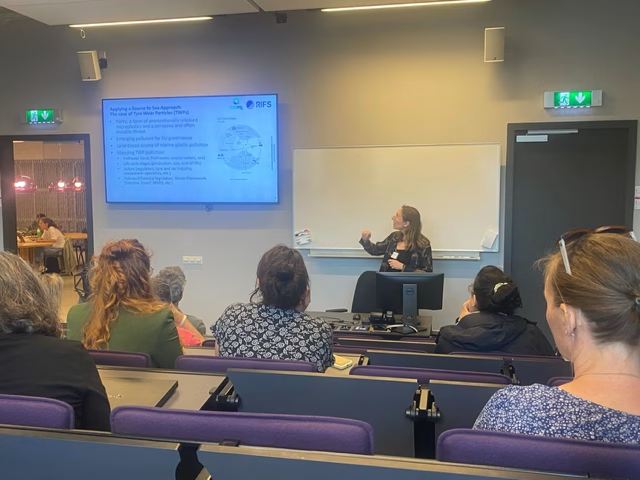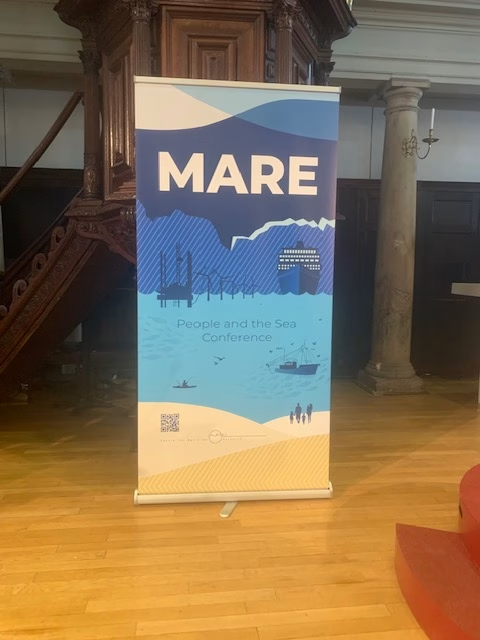From Source to Sea: Exploring an integrated approach to marine pollution at the MARE People & the Sea Conference
Written by Linda Del Savio (RIFS)
| August 28th, 2025 | News
The MARE People & the Sea Conference XIII held at the University of Amsterdam (The Netherlands) from 23 to 27 June 2025, brought together (social) scientists from around the world to delve into the complex relationship between humans and the ocean. This years’ MARE conference theme was ‘Tensions, Trade-offs and Transformations for the Ocean Decade and Beyond’.
Focusing on (small scale) fisheries, biodiversity resilience, climate change, social wellbeing, sustainable marine resource management, as well as marine and fisheries governance, the conference provided a crucial scientific platform for exploring challenges and opportunities facing the ocean.
Linda Del Savio, Research Associate at the Research Institute for Sustainability (RIFS) at the Helmholtz Centre for Geosciences (GFZ), presented a joint paper[1] exploring the Source to Sea approach. The paper, presented on 24 June 2025, as part of the conference stream ‘Conceptualizing Transformative Ocean Governance’, explores how rethinking marine pollution governance can underpin new ideas and opportunities to tackle marine plastic pollution.
The presentation, titled ‘From Source to Sea: Exploring a conceptual approach for plastic pollution policy integration in the European Union’ highlighted the importance of applying the Source to Sea concept to pressing pollution challenges. Too often, marine pollution governance efforts focus on sectoral approaches, e.g., remediation efforts after plastics have already entered and polluted the marine environment. The paper argues that a truly effective solution requires looking upstream, in addition to downstream measures, to identify and address pollution at its source. This includes looking at actors, responsible authorities and policies ‘from source to sea’ to better understand their dynamics.


Photo credit: Ben Boteler (left), Linda Del Savio (right)
The European Green Deal, with its zero-pollution ambition for a sustainable and climate-neutral Europe, presents a unique opportunity to adopt this more holistic approach. The Source to Sea concept—which recognizes the interconnectedness of land, freshwater, and marine environments—can act as a framework for considering policy integration across these domains. However, it is also noted that the Source to Sea concept is often applied inconsistently, lacking a universally agreed-upon definition. This research aims to clarify the application of the Source to Sea concept, demonstrating how it can be used to identify opportunities for policy integration and guide future research.
To illustrate this, the paper used Tyre Wear Particles (microplastics released from vehicle tyres) as a case study. While often considered a land-based pollutant, understanding their journey – from tyre production and use, to runoff into waterways, and ultimately to the ocean – highlights the crucial link between land and sea. Addressing this requires considering the entire life cycle, including the production and manufacturing of tyres and not just focusing on leakages and releases of microplastics into the marine environment.
Linda: “It was a privilege to participate in the MARE conference and share part of our research from SOS-ZEROPOL2030. I would like to thank the MARE Centre for Maritime Research and the University of Amsterdam for organizing and hosting such an inspiring event and for giving marine pollution governance a platform. I would also like to extend a special thank you to Ben Boteler and Judith van Leeuwen for their invaluable onsite support and insightful discussions throughout the event.”
[1] The paper is a collaboration of SOS-ZEROPOL2030 researchers, including Linda Del Savio (RIFS), Ben Boteler (RIFS), Judith van Leeuwen (WU), Kathrin Kopke (UCC), Thomais Vlachogianni (MIO_ECSDE), Lisa Devriese (VLIZ), Andy Booth (SINTEF Ocean), Elisabeth Berglihn (GRID-Arendal) and Thomas Maes (GRID-Arendal).